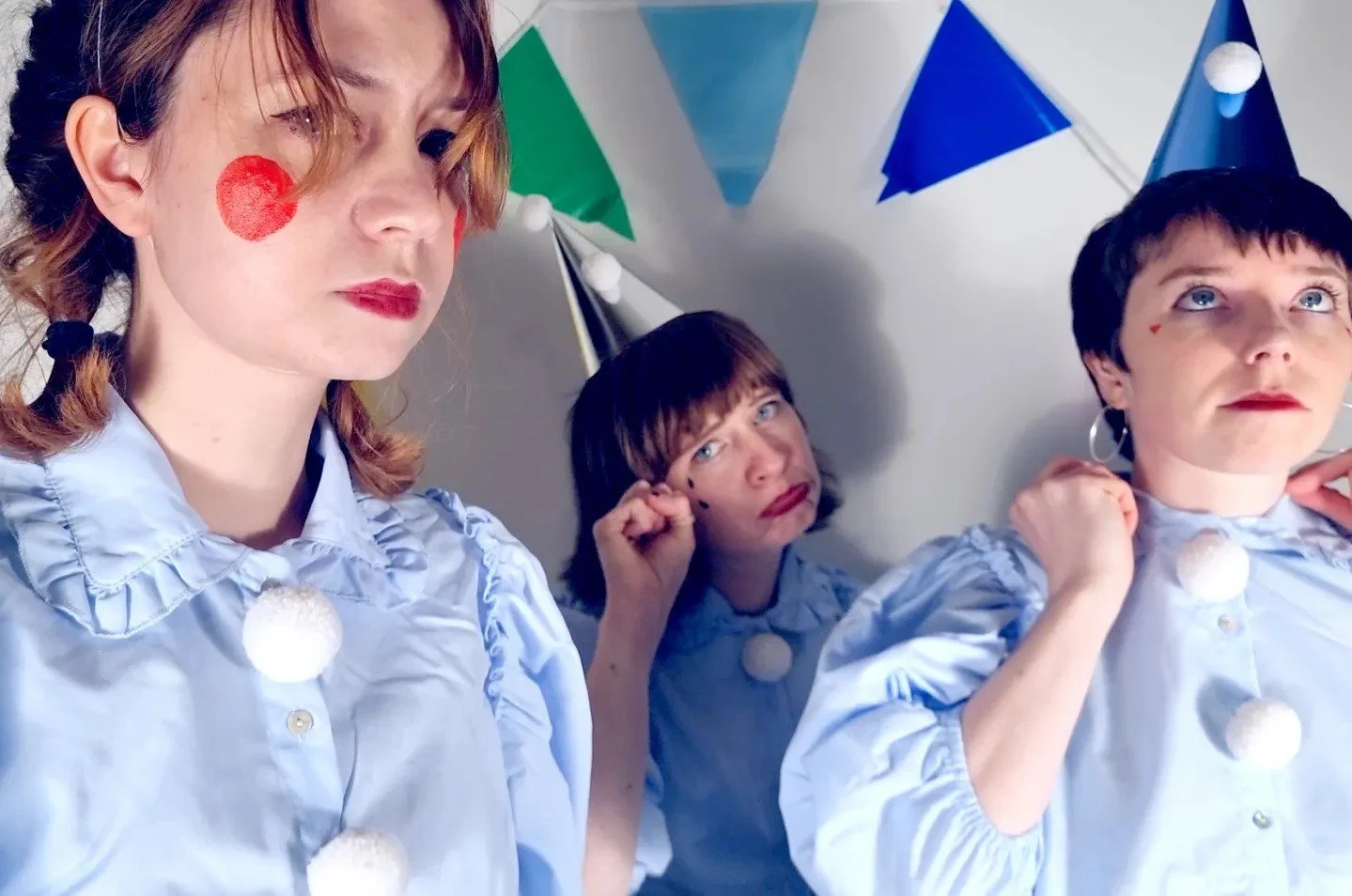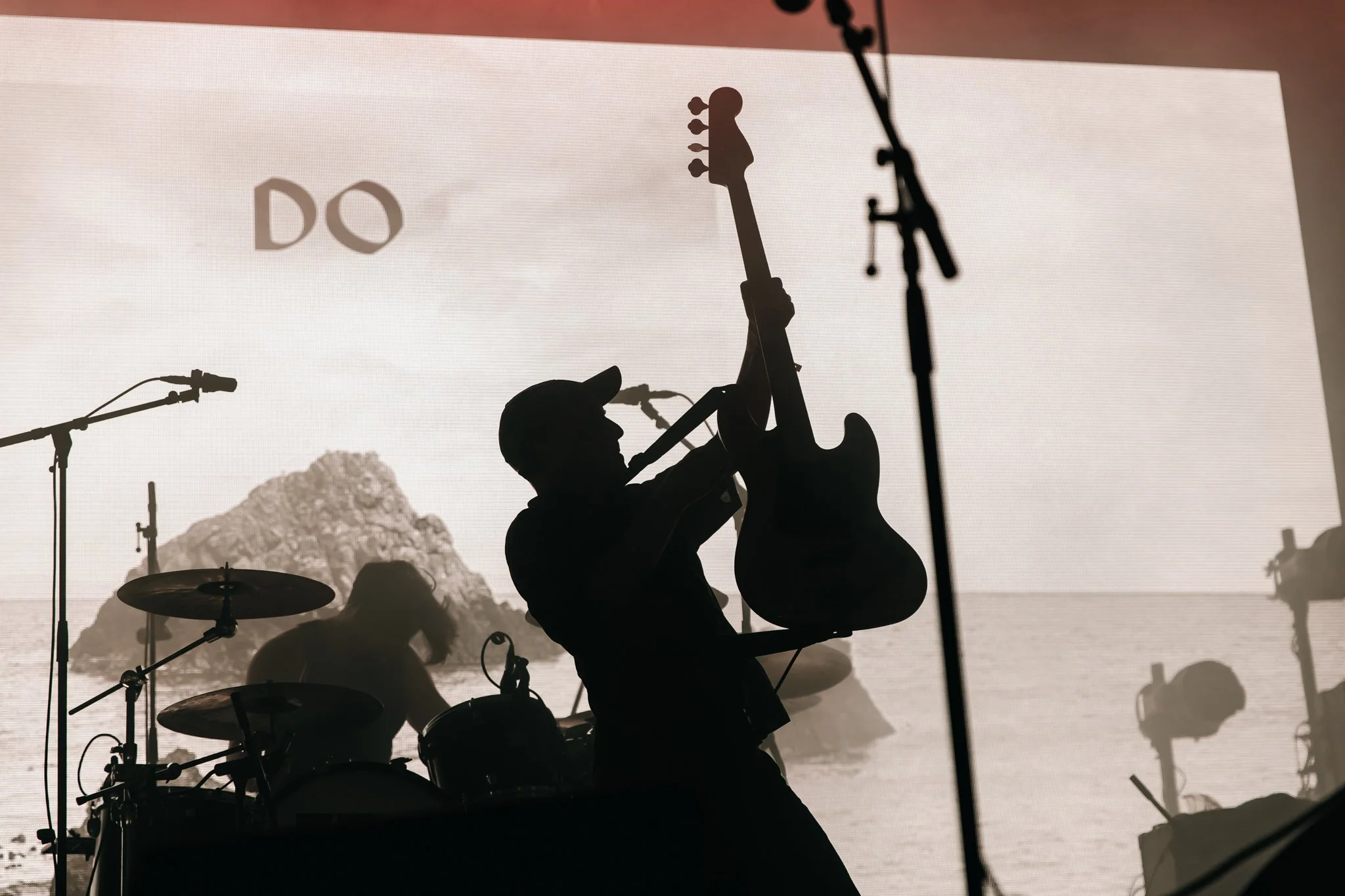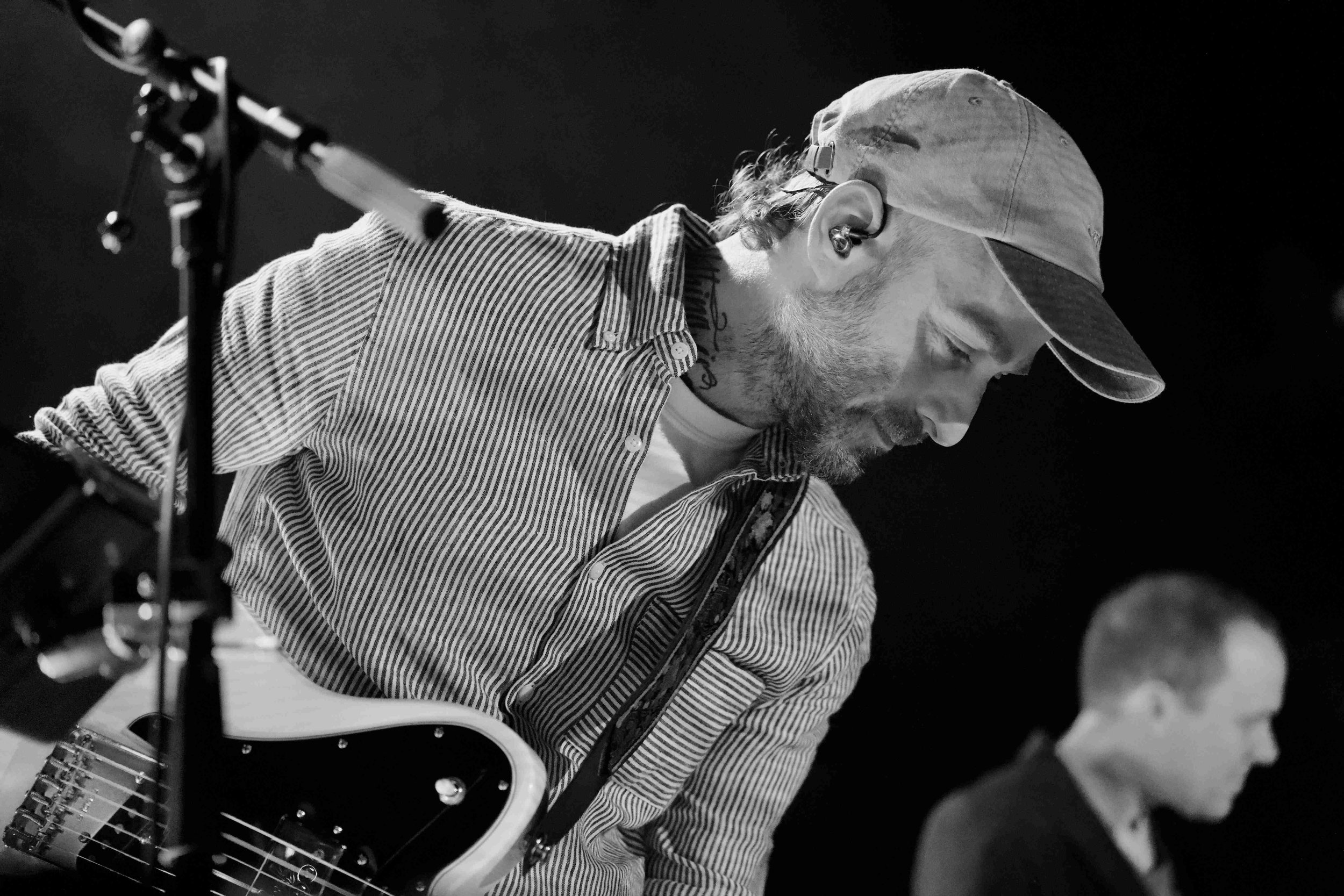Sløtface - ‘Film Buff’ review
Sløtface by Leah Solomons
Out this week is Sløtface’s Film Buff, an album that feels like it’s been crafted out of pure joy—a reflection of frontwoman Haley Shea’s love for both music and film. It’s insatiably fun, brimming with energy, wit, and an unabashed celebration of the pop culture references we all know and love. From the opening track, you’re thrust into a vibrant world where every song feels like a scene in a movie, complete with plot twists, familiar tropes, and characters that are both funny and relatable.
With catchy hooks, driving guitars, and lyrics that feel like a knowing wink to the audience, Sløtface has created a soundtrack not just for movie lovers, but for anyone who has ever felt boxed in by expectations. While the album might not dive deep into heavy emotional waters, it doesn’t need to. It thrives in its ability to entertain while still reflecting the everyday struggles we all face. Film Buff is an album that doesn’t take itself too seriously but still manages to strike a chord. A reminder that sometimes, art can be about having fun while still finding ways to express those inner demons.
The album kicks off with a bang in "I Used To Be A Real Piece Of Shit", and it’s almost like Haley Shea is taking us by the hand and pulling us straight into the story. We’re greeted by her voice first, before a driving guitar rhythm bursts in, propelling us forward like the opening scene of a teen movie. There’s something thrilling about how the song dives right in—no preamble, no hesitation. It captures that confused, chaotic energy of navigating young adulthood, with Shea’s voice acting as our guiding narrator. Once the full band kicks in, the song reveals its pop-punk heart, a genre Sløtface masters so well. With references to Wonder Woman and Tiger King, this track is a fun, self-deprecating romp through personal growth.
The next two songs, “Leading Man” and “Final Gørl” take aim at the deeply ingrained tropes we’ve come to know in film—ones that limit characters based on their appearances or traditional gender roles. In Leading Man, Haley Shea tackles the typecasting of the action star, forever stuck as the tough, emotionless villain because of his physicality, despite his "heart of gold." There’s a longing to break free from the surface-level expectations of being the brawny bad guy, and instead, to play roles with depth and vulnerability, like the "boy next door" or "love-interest." Meanwhile, Final Gørl flips the well-known horror trope of the "final girl" on its head. Instead of celebrating the virtuous woman who survives by adhering to society’s standards of purity and strength, Shea rejects the notion altogether, proclaiming, "I don’t wanna be your final girl." Both songs critique the narrow boxes films place characters—and by extension, people.
"Ladies of the Fight" is definitely my favourite so far. This is one of those songs that just feels like pure fun, but with a punch. The harder guitars come in strong, setting the tone for a track that has as much muscle as it does wit. There’s something delightfully playful about the lyrics—“I got the girls together to start our own fucked-up fight club, at 6:30 on Thursdays”—and the way Shea delivers them, it’s impossible not to sing along. It’s girly, it’s rebellious, it’s unapologetically chaotic. The whole thing feels like a private joke between friends, a subversive play on Fight Club that makes you want to join in on the action. When she says, “No crying in baseball, but that’s not a rule in fight club,” it’s the kind of clever lyricism that adds layers of humor and insight to what could have just been a simple rock song. Instead, it’s a standout moment of rebellion wrapped in pink boxing gloves.
As we move into "Lift Heavy", right from the first note, the bass takes center stage. This is fantastic writing, laying down a clear, complex line over a snare appropriately minimal in comparison. There’s space here, with Shea’s voice coming through sharp and precise, her lyrics cutting straight to the point. As the song builds, guitar enters with a familiar tone that I can only guess to be an inclusion from a frequent “Sløtface collective” contributor. By the time we hit the chorus, the whole track transforms into a dance jam, pulling you along with its infectious energy. There’s something so wonderfully relatable in the line, “I say no to feelings,” that makes you both laugh and nod in agreement. It’s the anthem for anyone who’s ever tried to outrun their emotions.
In contrast to the faster pace of the earlier tracks, "I Confess, I Guess" slows things down, offering a moment of reflection. The soft harmonies wrap around Shea’s lead vocals like a choir of angels, which is fitting given the song’s exploration of religious themes. There’s a fragile beauty here, as Shea sings of guilt and shame, her voice surrounded by those angelic harmonies in the instrumentation that almost feel like they’re echoing through the halls. Then, just as we’re lulled into this false sense of serenity, an angular guitar lead slices through, pulling us out of that ethereal soundscape and into something rawe. It feels like a disruption of the narrator’s own story, as though they’re being pulled out of their old narratives and forced to confront the truth.
The energy picks up again with "Charlie Calls", driven by fast drums and a melody that floats effortlessly above it all. There’s a lightness to this song, both in its sound and in its subject matter—a phone call from a sibling that brings comfort and a sense of calm. Notably, this track is the most obviously a deeply personal song. The emotions it evokes—relief, nostalgia, and connection—are universal, and the song’s soaring melody makes you feel like you’re flying right along with Shea as she sings. The freedom in the music mirrors the emotional release of talking to someone who just gets you, someone who can make everything feel okay again.
In contrast again, we move into "Tired Old Dog", woven with a weariness that feels deeply resonant. The song captures that tired, almost cynical feeling of having seen it all, done it all, and wanting to bow out gracefully. With lyrics like "I’m a tired old dog" and "Let the young guns take over now," the protagonist is done with the endless grind, refusing to take on "one last job." The music reflects this resignation—the guitars feel slower, more deliberate, as if even the sound itself is tired of the chase. What stands out here is the way Shea turns what could be a typical story of a weary detective into something personal and relatable. It’s about hitting that point in life where you're simply exhausted from constantly trying to save the day. The song’s tone isn’t necessarily sad, but it carries a deep sense of fatigue, the kind you only understand after years of running on fumes.
If there’s one song on this album that takes me back to my teen years, it’s "The Great Escape". There’s that classic pop-punk sound again, the kind that instantly transports you toparties you didn’t really want to be at, but went to anyway. Shea’s lyrics tell a story I think most of us can relate to—feeling out of place, desperate for an excuse to leave. “Your American Football hoodie screams rescue me too,” she sings, and I can’t help but laugh out loud. It’s one of those small, personal details that makes the song feel all the more real, like Shea is pulling from her own memories to paint a picture that’s funny and a little bit awkward, but also deeply relatable. There’s comfort in knowing you weren’t the only one who wanted to make a great escape back then.
Besides "I Confess, I Guess", "Quiet On Set" is the most tonally distinct track on the album, but on the opposite end of the spectrum. And it makes perfect sense for the penultimate song to stand out in this way. There’s an angular, aggressive quality here, matching the intensity of Shea’s lyrics as she shouts, “Smash my head into the fourth wall.” It’s chaotic and frantic, the kind of track that makes you feel like you’re spiraling right alongside the narrator. The sound is jagged and sharp, with a relentless energy that doesn’t let up. It’s one of those songs that’s meant to be experienced viscerally, as much through the gut as through the ears.
The album’s closing track, “Impressions of a Car Crash”, feels like a slow burn, pulling us back into a more introspective space after the intensity of earlier songs. Shea’s voice is soft, almost fragile, floating over lightly strummed guitar and subtle electronic textures. Tonally, the song sounds like a resolution—something gentle and final, as if we’re approaching the end credits of a film. But lyrically, it’s anything but. Here, Shea delves into feelings of frustration and doubt, as though she’s performing for an audience that’s watching but not truly seeing. The metaphor of the car crash—something so chaotic and impossible to ignore—mirrors the tension between trying to be noticed and feeling invisible. It’s not the beautiful, running-into-the-sunset ending we might have expected. Instead, we’re left with an almost cliffhanger moment, where resolution seems just out of reach. Perhaps, a poignant reflection on the whiplash of being an artist: the highs of creation, followed by the often-inevitable plunge into self-doubt. This is no tidy Hollywood ending, but a final, lingering question that hangs in the air.
With Film Buff, Haley Shea and Sløtface cleverly blend two beloved mediums—music and film—to explore their inner demons in an indirect yet deeply personal way. The songs, while catchy and layered with wit, don’t always dive into intense emotional depth. Instead, they offer something lighter, often humorous, and fun. So does that make them any less meaningful as pieces of art?
Not at all.
The real artistry of Film Buff lies in this ability to use narrative, humor, and metaphor to channel personal feelings of inadequacy, frustration, and self-discovery. Just as movies can range from deeply emotional dramas to popcorn flicks that provide joy and escapism, music also has the freedom to exist on that spectrum. Shea’s decision to embrace the lighter side of this emotional spectrum feels intentional and honest—an artistic choice in its own right.
In this way, Film Buff is opened to speaking to the universal experiences of self-exploration and acceptance through an approach that mixes fun with insight. Finding the balance between entertainment and meaning on this record, Haley Shea and Sløtface have created an insatiably fun, memorable, vibrant listening experience.
So much so that I am genuinely giddy to experience these songs live. Currently traveling the UK, with support from Cherym and SUDS on varying dates, we’re looking forward to seeing these vibrant songs brought even more to life with Sløtface’s energetic stage show. If you don’t have your ticket yet, get one fast, because these are three bands we could not recommend highly enough.
Film Buff from Sløtface is out 27 September via Propeller Recordings and available on all good streaming platforms.






































